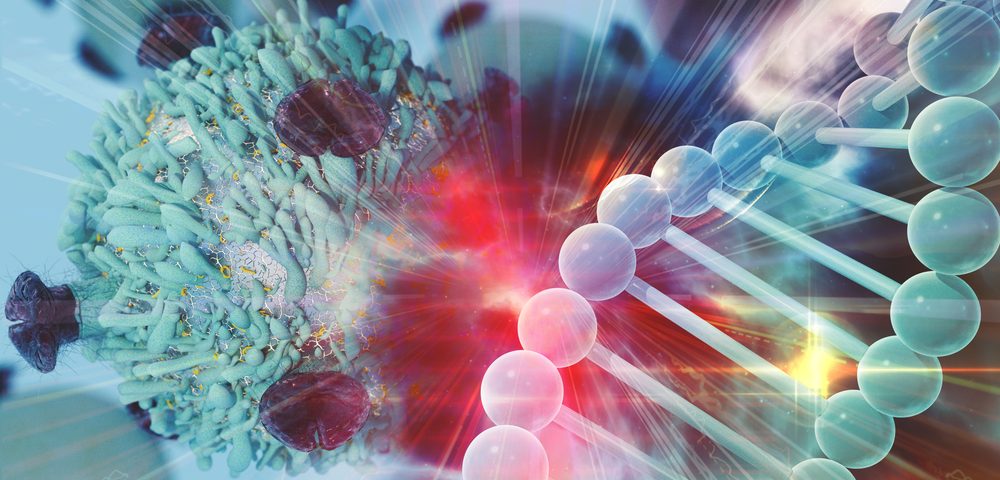Chronic B-cell activation — which can happen because of infectious mononucleosis, commonly caused by the Epstein-Barr virus (EBV) — triggers an excessive proliferation of certain B cells, which can evolve into a B-cell lymphoma. Although such chronic activation alone is not sufficient to drive cancer onset, vaccinating against EBV may work to lower the risk of getting a B-cell lymphoma, researchers say.
The study, “Chronic CD30-signaling in B cells results in lymphomagenesis by driving the expansion of plasmablasts and B1 cells,” was published in the journal Blood.
People who have been infected with Epstein-Barr virus have a higher risk for certain kinds of B-cell lymphomas, such as Burkitt’s lymphoma and Hodgkin’s lymphoma. Moreover, the virus is also a risk factor for several autoimmune diseases and is implicated in chronic fatigue syndrome. The underlying causes of this are still unclear.
Infection with EBV is the most common cause of infectious mononucleosis (also known as “mono” or “kissing disease”), an acute illness characterized by fever, extreme fatigue, swollen lymph nodes in the neck and armpits, and a sore throat, along with a large expansion of specific immune cells (CD8+ T cells) trying to fight the virus.
After entering the body, EBV establishes an initial infection at the lymphoid tissues of the throat. The virus then becomes inactive, although it may reactivate in some people.
EBV-infected cells are normally eliminated by the immune system, but in those with a weakened immune system (e.g. after a transplant or because of AIDS), the infection may spread and drive the development of cancer.
Infections with EBV typically result in large numbers of B cells carrying CD30, a surface receptor abundant in several lymphomas. However, the role of CD30-signaling and its contribution to the development of lymphomas is still poorly understood.
Ursula Zimber-Strobl, PhD, and her team at Helmholtz Zentrum München, in Germany, have been studying the biology of EBV as a tool to understand the development and function of the immune system, particularly B cells.
In this study, which was supported by German Cancer Aid, she and her team worked to decipher the link between CD30 and these events, in particular the development of B-cell lymphomas.
Before their study, it was not clear “whether the production of CD30 on the surface of lymphoma cells is merely a result of the cancer or whether it causally contributes to it,” Zimber-Strobl said in a press release.
Bearing this in mind, the team used mouse models to study two questions: how CD30 is expressed across different B-cell types and whether persistent activation of CD30 in B cells — which can result from prolonged stress on the immune system, for example, at the onset of infectious mononucleosis — can trigger the development of lymphoma.
First, the team saw that a subtype of B cell, called B1 cells, were very rich in CD30 and other B-cell precursors called plasmablasts.
The team then developed a mouse model that had B cells carrying continuously active CD30. As a result of this chronic activation, mice developed increased amounts of B1 cells and plasma cells, the cells responsible for the greatest part of the antibodies produced in the body.
The constant activation of CD30 stimulated the proliferation of those B cells, as it kept sending signals inside cells that promoted growth.
Eventually, as mice aged, the excessive growth of those cell populations led to the development of B-cell lymphomas.
“In the experiment, we found that the likelihood of B-cell lymphoma development is greatly increased when B lymphocytes carry permanently activated CD30 molecules on their surface,” said Stefanie Sperling, a doctoral student at AGV Research Unit Gene Vectors.
“We conclude that our mouse model mirrors chronic B-cell activation with increased numbers of CD30+ lymphocytes and provides experimental proof that chronic CD30-signaling increases the risk of [the development of lymphoma],” the researchers said.
Researchers are now studying whether vaccination against EBV may be a workable approach for reducing a person’s risk of B-cell lymphoma, as this may prevent too much activation of CD30 and B-cell growth thereafter.
However, the data also indicates that “chronic CD30-signaling alone is not sufficient to induce lymphomagenesis,” researchers noted. A mutation happening in as few as one of these activated cells seems a key event to give rise to cancer.
In addition, this study offers potential insight on new therapy targets for cancer.
“Once we’ve studied them, CD30-triggered signaling pathways could serve as targets for new lymphoma therapies,” Zimber-Strobl said.


